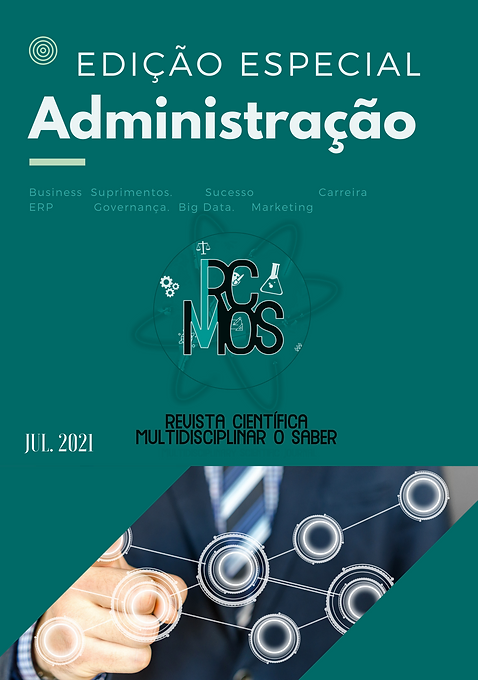INTERNATIONAL BUSINESS
DOI:
https://doi.org/10.51473/rcmos.v1i1.2021.677Keywords:
Competitive Strategies, International Business, PlanningAbstract
The objective of this work is to understand the economic, social, cultural, political, legal, and financial differences that require strategic planning for the internationalization of organizational activities. The methodology used was bibliographic, with a qualitative approach. Internationalization is an innovative aspect for the survival of organizations, and it should be a process guided by the economic, political, social, cultural, financial, and legal differences of the country where internationalization is sought, while also requiring a manager profile with specific personal, organizational, and professional attributes to overcome challenges in these aspects and avoid failures. The planning of internationalization should include various decision-making strategies on how to enter this market, such as mergers/acquisitions and foreign direct investment, both of which have advantages and disadvantages that should be analyzed concerning cost/benefit relationships and threats/opportunities for small, medium, and large organizations as well as emerging ones. Successful cases of internationalization of Brazilian companies contribute to this process, such that the competition of globalized companies emerges as a line of thought that enables their survival in terms of competitive strategies.
Downloads
References
DOMINGUES, C. R.; BUENO, J. M. Estratégias de Internacionalização de Empresas Emergentes: Um Estudo Comparativo de Casos Brasileiros. (2011). Rio de Janeiro. Available: http://www.anpad.org.br/diversos/down_zips/58/ESO2574.pdf. [Acessed 04 out. 2020.
ECHEVESTE, S.; VIERIA, B.; VIANA, D.; TREZ, G; PANOSSO, C. (1999). Perfil do Executivo no Mercado Globalizado. RAC [online], 3, 167-186. Available: https://www.scielo.br/pdf/rac/v3n2/v3n2a09.pdf. [Acessed 05 October 2020].
JANSEN, L. K.; ROTONDARO, J. R. G; JANSEN, J. U. Estratégias de sobrevivência para pequenas e médias empresas em ambientes globalizados: um estudo de caso de empresas eletroeletrônicas. Gest. Prod., 12, 405-416, 2005. Available: https://www.scielo.br/scielo.php?script=sci_arttext;pid=S0104-530X2005000300010. Acessed 08 Out. 2020.
GANDIN, L. A.; HYPOLITO, A. M. (2003). Dilemas do nosso tempo: globalização, multiculturalismo e conhecimento. Currículo sem Fronteiras, 3, 5-23. Availble:
v. 7 ed. especial (2021): RCMOS - Revista Científica Multidisciplinar O Saber. ISSN: 2675-9128
http://www.curriculosemfronteiras.org/vol3iss2articles/boaventura.pdf. [Acessed 06 October 2020].
HAIBIN, N. (2010). Parceria Global Emergente. Rev. bras. Polít. Int. [online],53, 183-192. Disponível em: https://www.scielo.br/scielo.php?pid=S0034-73292010000300011;script=sci_abstract;tlng=pt. [Acessed 03 October2020].
HILAL, A.; HEMAIS, C. A. (2003). O processo de internacionalização na ótica da Escola Nórdica: evidências empíricas em empresas brasileiras. RAC, [online], 7, 109-124. Available: https://www.scielo.br/pdf/rac/v7n1/v7n1a06.pdf. [Acessed 03 October 2020].
SUEN, A. S.; KIMURA, H. Fusão e aquisição como estratégia de entrada (entre mode) no mercado brasileiro. Cadernos de Pesquisa em Administração [online], 2, 53-60. Availbale: http://suen.com.br/papers/fusao_e_aquisicao_1997.pdf. [Acessed 05 October 2020].
MACADAR, B. M. A internacionalização de grandes empresas brasileiras e as experiências do Grupo Gerdau e da Marcopolo. Ensaios FEE [online], 30, 7-34, 2009. Disponível em: https://revistas.fee.tche.br/index.php/ensaios/article/view/2268/2617. Acesso 05 out. 2020.
Downloads
Published
Issue
Section
License
Copyright (c) 2024 Danillo Miguel de Sales Santos (Autor/in)

This work is licensed under a Creative Commons Attribution 4.0 International License.










